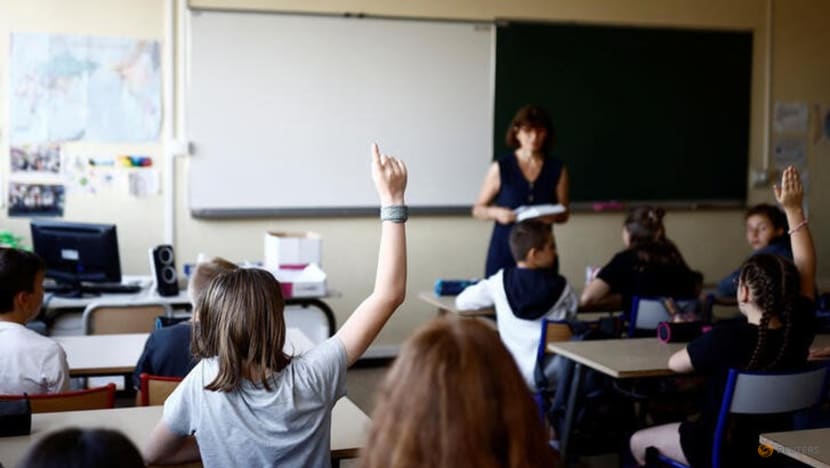Some schools in France to take part in uniform trial following abaya ban
The move comes after the French government banned the abaya - a long dress worn by some Muslim women and girls - in schools, on the basis of secularism.

Schoolchildren work in a classroom on the first day of the new school year after summer break in Savenay, France, September 4, 2023. REUTERS/Stephane Mahe/files
PARIS: Some schools in France will take part in a uniform trial later this year as part of a shake-up of what children wear to class.
Schools across the country, where wearing a uniform is not part of school life for most children, can volunteer for the uniform trials from September, when the next school year begins.
The move comes after the French government banned the abaya - a long dress worn by some Muslim women and girls - in schools.
French Prime Minister Gabriel Attal said in August last year, when he was the Education Minister, that the loose-fitting clothes violated the national principle of secularism.
“The abaya has no place in our schools, not more than religious symbols. Saying this conforms to our most fundamental principles of secularism and neutrality. This choice is one that is faithful to our values and it is a rejection of communitarianism,” he said at the time.
However, some lawmakers on the left have criticised what they call a "war on religion".
HISTORY OF ISLAMIC CLOTHING
The Action Rights of Muslims group filed what turned out to be an unsuccessful appeal against the abaya ban at the Council of State, the country's highest administrative court.
The group said the ban impacts pupils as young as 14 years old.
“There are parents who are shocked … and they don’t know what to do. They feel discriminated against, they feel excluded, they don’t understand. They feel stigmatised, they feel shocked. And me, what can I do? It’s a law that is … terrible,” said the group’s director Sihem Zine.
One of the most well-known examples of the controversy surrounding Islamic clothing in French schools took place in 1989 in the town of Creil, north of Paris. In the incident, three girls were expelled for refusing to remove their headscarves.
The expulsion sparked months of media, political and social debate in France, and the arguments and counter-arguments are famously known as “l’affaire du foulard”, or the “scarf affair”.
Following the 1989 controversy, the French parliament passed a law in 2004 prohibiting the wearing of conspicuous religious symbols in public schools, including Christian crucifixes, Jewish skullcaps, Sikh turbans and Islamic headscarves.
INTENT OF SECULAR OBJECTIVES
Some feel that the government's secular objectives are not grounded in the well-being of students.
“Once again, they aim just to be able to create a wave, to speak about being firm on this issue, to enter into a discourse that addresses ‘civilising’ certain ‘wild and savage’ practices, and so for people like me, we are completely against this way of thinking. It's a colonial mindset which is very dangerous,” said founder of Union of French Muslim Democrats Najib Azergui.
A 1905 law enshrines the division of church and state in France.
But nearly 120 years later, deep divisions remain between the state and religious groups, and also over whether ministers can come to a consensus on school clothing.













